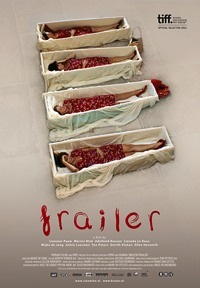A Peculiar Experiment in Content Guiding Form
 Experimental director Mijke de Jong’s latest feature-length film, is a curious exercise in content guiding form. It’s ostensibly an investigative treatise on the nature of annihilation anxiety and the vast array of ideological, theological and sociological questions that inevitably arise in the face of mortality, but it never settles for pat answers or allows anything to be glibly categorized. Frailer is a messy, inconsistent, even challenging work that actually manages to succeed despite its own emotional and inconsistent framework.
Experimental director Mijke de Jong’s latest feature-length film, is a curious exercise in content guiding form. It’s ostensibly an investigative treatise on the nature of annihilation anxiety and the vast array of ideological, theological and sociological questions that inevitably arise in the face of mortality, but it never settles for pat answers or allows anything to be glibly categorized. Frailer is a messy, inconsistent, even challenging work that actually manages to succeed despite its own emotional and inconsistent framework.
Initially, this handheld, Dutch, existential female-bonding dramedy presents as a linear narrative. Mouse (Leonoor Pauw), a woman coping with a terminal cancer diagnosis, is surrounded by friends—Ted (Marnie Blok), Carlos (Adelheid Roosen) and Lian (Lieneke le Roux)—attempting to make the most of the time they have left. They garden together, share meals, wear matching dresses and plan elaborate road trips to various rural locales, reiterating the familiar cinematic trope of nature as forced metaphor for introspection and escape.
Before the reality of what they’re dabbling with sets in, the dynamic is (mostly) lighthearted. Casual discussions about sexuality and varying idiosyncrasies have a natural, improvised ease that suggests these women have known each other for a very long time. And during these early moments, when they cottage together, smoke pot and take a misguided trip to ride on a hot air balloon, which proves to be a genuinely hilarious sequence when one of them throws a temper tantrum, there’s a very standard, heartwarming trajectory that implies that Frailer will reiterate the obvious message that relationships and memories are paramount when confronting mortality.
But, what we learn—and what might be a potential spoiler—is that Leonoor Pauw really is dying of cancer. Her real-life friends start to struggle with the idea of creating a fictional narrative surrounding what is proving to be an emotionally turbulent and exceedingly confusing time in their lives. From here, de Jong lets her form deteriorate into an experimental documentary with on-screen captions accompanied by Low’s “Laser Beam” and various montages and inserts denoting the decay and rapidly increasing frailty that Leonoor suffers.
There’s also an entirely different social structure introduced when Leonoor’s family—two daughters and a husband—take center stage in her life once she becomes housebound.
In addition to challenging our expectations as an audience as well as our tendency to remove ourselves from the responsibilities of a narrative if there’s the safety net of performance, it also raises some interesting questions about the purpose of form. Since de Jong ditches her structure—a structure that helps guide us to a familiar resolution that ultimately helps us cope with our own annihilation anxieties—we’re left floundering, forced to confront the very nature of what our protagonist is struggling with on screen.
Though the wild disorganization and entirely emotional rendering of these later moments makes Frailer a less coherent work overall; this style and tactic is also extremely apropos. What Leonoor and her family discover is that there really isn’t an easy answer or a way to cope with such a final, specific event. And by not comforting the audience with a familiar framework, de Jong reiterates the themes of confusion, discomfort, frustration and the pain of being unable to escape—or wake up from—such a fate.
As such, despite the chaotic manner in which it was assembled, there is a lot to glean from Frailer, even beyond the painful specificity of existing as a documentation of someone’s gradual deterioration and their process of letting go.
Reviewed on September 11th at the 2014 Toronto International Film Festival – Contemporary World Cinema Programme. 80 Minutes
★★★½/☆☆☆☆☆


